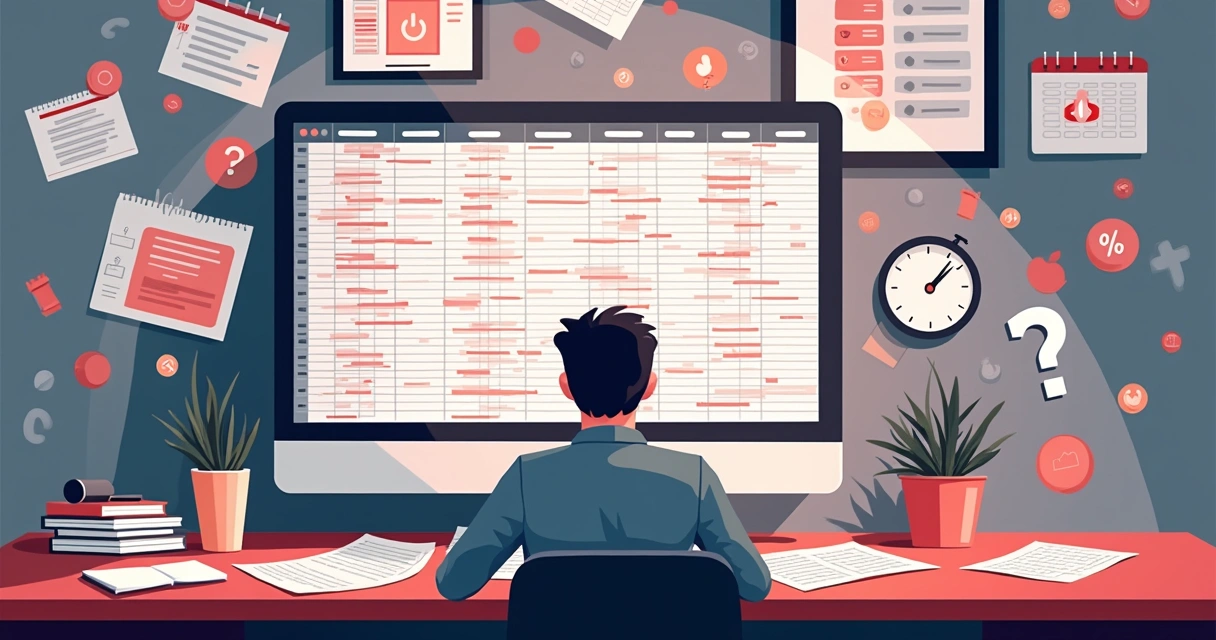Understanding the challenges of spreadsheets for consultants
Many consultants and coaches find themselves stuck using spreadsheets for managing clients. It can feel like digging through a mountain of data just to find a single lead. This process is not only frustrating but also time-consuming. Spreadsheets can quickly become chaotic, making it hard to see the overall picture and track your client interactions effectively.
One major drawback is the lack of automation. Without reminders or notifications, following up with clients can slip your mind. You might tell a client you’ll check in next week, only to forget, which could hurt your relationship. And let’s face it, trying to remember details from various conversations is a nightmare when updates aren’t recorded in real time.
Spreadsheets also make it tough to categorize clients. This lack of organization can hide important opportunities. In contrast, a dedicated CRM like Atlas CRM helps you keep everything tidy in one spot. You can organize client information easily, ensuring you never miss a crucial follow-up and can focus on building stronger relationships.
Switching to a CRM can truly transform your client management experience, making your work smoother and more effective.
 Limitations of spreadsheets in client management
Limitations of spreadsheets in client management
Using spreadsheets to manage clients may seem convenient at first, but it often leads to more headaches than help. For many independent consultants and coaches, spreadsheets are the go-to tool for tracking leads and client interactions. However, this reliance can create serious problems down the line.
First, finding a specific lead can be a challenge. Imagine scrolling through endless rows of data just to locate one person’s information. This can waste precious time and even cause you to miss out on connecting with potential clients. Remember, the faster you can access information, the better your follow-up can be.
Next, let’s talk about keeping up with clients. Without proper reminders, it’s easy to lose track of who you’ve reached out to and when. You might promise to follow up but forget amidst your busy schedule. This not only affects your relationships but can also hurt your reputation.
Also, spreadsheets often lack depth when it comes to your interactions. Sure, you may have basic contact info, but what about details from conversations? If you don’t record important notes, you risk forgetting key points about your clients. Here are some critical areas to consider:
- Conversation Tracks: Keeping records of what you discussed helps in nourishing the relationship.
- Client Preferences: Remembering what your clients like or dislike makes a world of difference.
- Next Steps: Documenting action items ensures that nothing is overlooked.
All these limitations can hold you back and prevent your business from thriving. If you’re using spreadsheets, it might be time to think about more effective tools. Upgrading your client management can save time and improve your relationships. It’s worth the investment to create a smoother process for yourself and your clients.
How spreadsheets complicate lead tracking
Managing leads with spreadsheets can quickly become overwhelming. Initially, it seems easy to have all your contacts in one spot, but as you add more names, things can get messy. Just think about it—every time you get a new lead, you have to type in their information manually. It’s a common slip to type in a phone number wrong. One little mistake can mean you can’t reach out to someone who might be interested in your service.
As your list grows, keeping track of who’s at what stage becomes tricky. You might find yourself scrolling endlessly, trying to remember if someone needs a follow-up or if you haven’t spoken in a while. It’s stressful to juggle multiple clients and their different statuses without a clear system. Imagine how much easier it would be if you had a simple list that stood out.
Spreadsheets also lack reminders. You might plan to contact a lead in a few days, but without a reminder, it’s easy to forget. This can mean losing out on potential business. It makes you wonder: is managing important relationships this way really effective?
Another downside is the lost insights. Spreadsheets don’t give you a quick view of your leads or highlight urgent follow-ups. In a fast-paced world, having an organized overview is key for maintaining good connections. It’s essential to think about how you can streamline your lead management and make your process smoother and more effective.
The pitfalls of follow-up reminders in spreadsheets
Relying on spreadsheets for client follow-ups can be a recipe for disaster. It might seem easy to keep track of dates and notes in a simple table, but doing so often causes important tasks to fall through the cracks. For example, if you promise a client a call next week, it’s easy to forget amidst your busy schedule. This leads to clients feeling neglected, which can hurt your relationship with them.
When you’re juggling multiple clients, can you truly remember who needs a follow-up? It’s overwhelming! Depending solely on your memory can lead to missed opportunities and damage your professional reputation. Here are a few downsides to keep in mind:
- Memory Overload: With a lot on your plate, forgetting a follow-up is common.
- Inconsistent Communication: Missing even one follow-up can make clients feel undervalued.
- Lost Business: Not reaching out can mean losing potential deals and trust.
Switching to a dedicated CRM system, like Atlas CRM, can simplify your life. It sends reminders, helping you stay organized and making sure every client feels important. Imagine getting a notification prompting you to reach out—your clients will appreciate the timely feedback. This means better relationships and more opportunities for your business.
With a tool designed for managing contacts and follow-ups, you can focus on what really matters: growing your business and building strong client connections.
Client interaction history: A missing piece
When you manage client relationships using spreadsheets, you might overlook something crucial: your interaction history. Keeping track of conversations and meetings is key to building strong connections. Think about it: after months of working with someone, you want to recall their feedback from previous discussions. In a spreadsheet, you often find scattered notes or sometimes even nothing at all. This can leave you feeling unprepared, making your conversations seem less personal.
Without a clear history of interactions, you risk missing important context. You might remember some details, but crucial information can easily slip through the cracks. For example, if a client has specific preferences or deadlines, having a well-organized record can save you from forgetting them. This not only aids in follow-ups but also reduces the chance of misunderstandings.
Consider how client needs can change swiftly in today’s fast-paced world. Without a structured way to track these shifts, you could miss vital updates that directly impact your work. Repeatedly asking clients for the same information can be frustrating for them, and it might even shake their confidence in your ability.
By keeping a clear and detailed interaction history, you show that you care about your clients’ success. It helps you stay engaged and responsive to their evolving needs. Reflect on how improving this aspect of your approach could strengthen your client relationships. After all, a personalized touch can make a world of difference in building trust and loyalty.
 The advantages of using a dedicated CRM like Atlas CRM
The advantages of using a dedicated CRM like Atlas CRM
Using a CRM instead of spreadsheets can completely change how you manage your client relationships. With a simple and effective customer relationship management system, you can focus on what truly matters: building strong connections with your clients. Here are some key benefits you’ll notice when you make the switch.
Streamlined Processes: Automating tasks is a game changer. Picture this: you set up reminders for follow-ups, and you receive notifications when it’s time to check in with clients. This means you can be more proactive without having to remember every detail. For example, if you have a client whose birthday is coming up, a CRM can remind you to send a thoughtful message.
Organized Client Data: Keeping all your client information in one place makes everything easier. A CRM allows you to see past communications, preferences, and even important notes all at once. When you understand your clients’ needs better, it helps you offer a more personalized service. This can lead to increased loyalty and trust.
Here’s how a CRM can impact your daily work:
- Easy Access: Quickly find any client’s history, so you’re never caught off guard during a call.
- Follow-up Monitoring: Instantly know who needs attention, allowing you to prioritize your tasks effectively.
- Team Collaboration: When working with a team, sharing notes and updates in real-time keeps everyone on the same page.
Sticking to spreadsheets may seem easier, but they can lead to lost information and missed opportunities. By moving to a CRM, you’ll save time and reduce stress while providing better service to your clients. Discover the difference it can make in your business today.
Streamlining processes with automation
Imagine how much easier your life could be as an independent consultant or coach. Switching from spreadsheets to a dedicated CRM like Atlas CRM can truly transform the way you manage your tasks. Instead of relying on messy spreadsheets and complicated lists, think about how nice it would be to automate your daily responsibilities.
Picture this: you’re juggling multiple clients and need to remember important follow-ups. With spreadsheets, you might write down notes or try to recall everything from memory, which is risky. But with a CRM, you can set up automated reminders that alert you when it’s time to reach out. This way, your clients feel prioritized and cared for, which is essential for building trust.
Consider the hours you spend remembering dates and deadlines. If you could automate that, just imagine what you could do with all that extra time! Instead of hunting for information, a CRM organizes your client details right at your fingertips. When you have client information handy during calls or meetings, it boosts your confidence and makes those interactions more productive.
Sticking to spreadsheets can slow you down and limit your potential. Embracing automation through a CRM not only streamlines your processes but also helps you maintain healthy client relationships. You’ll find it easier to stay organized and deliver the best service possible. It’s about making your work smoother and getting back to what you love—helping your clients succeed.
Building relationships through efficient client management
Managing client relationships effectively is essential for success. If you’re still using spreadsheets, you might miss out on key details that truly matter to your clients. Just think about it: how can you nurture a connection without knowing what’s been discussed before? Switching to a dedicated CRM like Atlas CRM can completely transform how you interact with your clients.
With a CRM, you can easily access a client’s entire history in one place. You’ll quickly remember their preferences, previous conversations, and needs. This understanding allows you to engage in a much more meaningful way. Here are some important advantages:
- Personalized Communication: People love feeling special. When you tailor your messages based on a client’s past interactions, it shows you care.
- Proactive Follow-ups: Automated reminders help ensure you never miss an opportunity to check in. Clients appreciate being remembered!
- Clear Insights: With all your information organized, you can make better decisions and customize your offerings more effectively.
Using the right tools can totally change the game. A CRM simplifies the entire process of managing client relationships. Instead of wrestling with chaotic spreadsheets, you can focus on building stronger connections. If you want to invest in a better approach, embracing a CRM can increase your efficiency and the quality of your client relationships. The positive impact is worth it!
 Real-world examples: Success stories from using CRM
Real-world examples: Success stories from using CRM
Have you ever felt overwhelmed trying to keep track of your clients? Many independent consultants and coaches have been there. Take Sarah, for example. She used to manage her client information using spreadsheets. With so many details to remember, it often felt like chaos. Important follow-ups were easily missed, which frustrated both her and her clients. But once she switched to a dedicated CRM tool, everything changed. Now, she has all her client interactions in one place, making it easy to remember their goals and preferences. This has helped her create stronger connections with her clients.
Mark’s story is similar. As a marketing consultant, he juggled multiple clients at different stages. Keeping track of who to contact next was a daily struggle. After he decided to try a CRM, life got a lot easier. The system automated reminders for follow-ups, so he never had to worry about forgetting a client again. As a result, Mark noticed a boost in client satisfaction, leading to more referrals and new business. Automation freed up his time to focus on what really mattered—transforming his clients’ marketing strategies.
Emily, a financial coach, had a different battle. She spent countless hours entering client data and tracking payments. This endless paperwork took her away from helping people. When she began using a CRM, automation streamlined her processes. Clients now receive automatic payment reminders, allowing Emily to dedicate her efforts to providing valuable advice. She found herself more engaged and connected with her clients.
These stories show the real difference a solid client management tool can make. By simplifying your processes, you can nurture your client relationships, increase efficiency, and ultimately enjoy greater success.
Encouraging the transition to CRM solutions
Switching from spreadsheets to a Customer Relationship Management (CRM) tool might feel overwhelming at first, but the rewards can be huge. Have you ever missed an important follow-up or lost track of a valuable lead? You’re not alone in this struggle. Many consultants and coaches have faced similar challenges and found that a CRM can truly make a difference.
Think about the benefits a CRM could bring to your daily work. Here are some key reasons to consider this upgrade:
- Boosted Efficiency: With a CRM, you can automate repetitive tasks. This means less time on data entry and more time for what really matters—connecting with your clients.
- Improved Organization: A CRM keeps all your client information in one place. You can access notes, conversations, and preferences easily, which helps you offer a personalized touch.
- Automated Reminders: Forgetting important follow-ups is now a thing of the past. A good CRM will remind you when to reach out, ensuring that your communication remains consistent.
Imagine walking into a meeting fully prepared because all your client details are ready at your fingertips. This not only shows professionalism but also helps your clients feel valued. Transitioning to a CRM may require some effort, but the payoff in smoother workflows and stronger client relationships is well worth it. So, why not take the step that can transform your business for the better?
Conclusion: The case for moving beyond spreadsheets
Using spreadsheets for managing clients can feel easy at first, but it comes with many challenges. For instance, ever missed an important follow-up or lost track of a lead? These are common issues that can create frustration and even harm relationships with clients. When you think about it, it’s risky to rely on a clutter of spreadsheets that could lead to missing critical client interactions.
Now, picture this: what if you had all your client information in one place? That’s where a solid CRM system like Atlas CRM comes in. With it, you’ll not only have organized data but also automated reminders for follow-ups. This means you stay on top of your game and build stronger connections with clients.
Imagine how much smoother your workflow would be. Instead of stressing about tracking leads, you could focus on understanding your clients better and providing excellent service. A dedicated CRM does more than streamline your tasks; it transforms your approach to client management.
Making the switch is a smart choice. It allows you to nurture relationships that matter, ultimately boosting your business’s growth and success.







